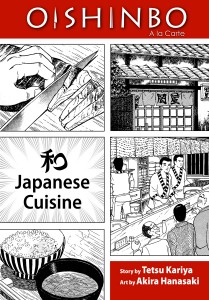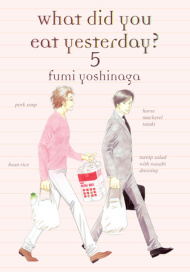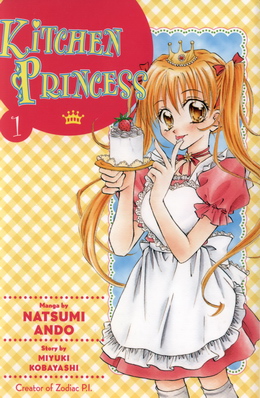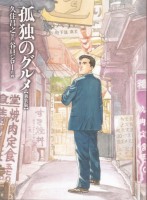On the eve of Thanksgiving, we decided to whet our appetite for tomorrow’s dinner with a conversation about our favorite food manga. Our guests around the table today are the Manga Bookshelf bloggers: Melinda Beasi, who runs Manga Bookshelf and blogs there as well, Ash Brown of Experiments in Manga, Michelle Smith of Soliloquy in Blue, Anna N of Manga Report, and Sean Gaffney of A Case Suitable for Treatment. Bon appetit!
Michelle: I’ve thoroughly been enjoying What Did You Eat Yesterday?, especially the idea that this is everyday fare that a person on a budget might be able to make, were they so ambitious. Somehow it’s so refreshing to see someone using powder mixes! I love Shiro’s shopping trips and his sense of triumph upon scoring a good deal. My one regret is that I really can’t imagine how the vast majority of what he makes actually tastes.
Another food manga I enjoy, somewhat despite myself, is Food Wars!: Shokugeki no Soma. I kind of feel like I should be more bothered by the fan service than I am, but to me it seems purposefully ridiculous and not meant to titillate, but I suppose it could be doing both things at once. Anyway, this manga is basically Prince of Tennis with food. You’ve got the cocky protagonist, whose father possibly is a famous cooking ninja or something, who immediately takes on and bests his classmates at an elite culinary school. And being that it’s kind of sports manga with food, it is completely up my alley.
 Ash: I love food and I love manga, and so when the two come together in the same work I’m always going to check it out. More often than not, I end up enjoying it, too. My first food manga was Oishinbo: A la Carte, and it remains one of my favorite food series. With its food and family drama, Oishinbo is both informational and highly entertaining. Occasionally it can be controversial as well. Despite being a best-selling food manga in Japan, back in May publication of the series was suspended after its depiction of health issues in the Fukushima area. The series can be very opinionated, and at times those opinions aren’t widely held or popular. Another example is the support shown in favor of whaling. But I appreciate a work that can take a strong stance; even if I don’t necessarily agree with it I usually learn something by reading it.
Ash: I love food and I love manga, and so when the two come together in the same work I’m always going to check it out. More often than not, I end up enjoying it, too. My first food manga was Oishinbo: A la Carte, and it remains one of my favorite food series. With its food and family drama, Oishinbo is both informational and highly entertaining. Occasionally it can be controversial as well. Despite being a best-selling food manga in Japan, back in May publication of the series was suspended after its depiction of health issues in the Fukushima area. The series can be very opinionated, and at times those opinions aren’t widely held or popular. Another example is the support shown in favor of whaling. But I appreciate a work that can take a strong stance; even if I don’t necessarily agree with it I usually learn something by reading it.
Currently my go-to food manga is What Did You Eat Yesterday? Granted, it’s not just the food that particularly appeals to me about the series; I also welcome its realistic portrayal of gay life in contemporary Japan. Food frequently has an important role to play in Fumi Yoshinaga’s manga, as can be seen in Antique Bakery and Not Love But Delicious Foods among others, but What Did You Eat Yesterday? takes it to a whole new level. I know plenty of readers who don’t really enjoy the detailed food preparation and recipes found in the manga, but I’m one of those people who can happily watch cooking and food shows for hours at a time (if I actually had the time, that is) so it doesn’t bother me at all. And I especially like how the creation of a dish is shown to be a method of personal expression and communication.
 Melinda: I’ll pipe up here to add myself to the list of folks who are rabidly consuming What Did You Eat Yesterday? There’s pretty much nothing I love more than the combination of Fumi Yoshinaga and food. As a food-lover who does not cook, I suppose I especially appreciate the fact that even food-preparation serves to move the story along in a Yoshinaga manga, so I’m never left to face my inadequacies in the kitchen alone; there’s always a little bit of human drama to keep me company. Actually, I think that’s a significant part of what always drew me to CLAMP’s xxxHolic as well. It’s not a food manga by any means, but there’s an enormous amount of food and food-preparation involved in the story. These things are inextricable from the character’s lives.
Melinda: I’ll pipe up here to add myself to the list of folks who are rabidly consuming What Did You Eat Yesterday? There’s pretty much nothing I love more than the combination of Fumi Yoshinaga and food. As a food-lover who does not cook, I suppose I especially appreciate the fact that even food-preparation serves to move the story along in a Yoshinaga manga, so I’m never left to face my inadequacies in the kitchen alone; there’s always a little bit of human drama to keep me company. Actually, I think that’s a significant part of what always drew me to CLAMP’s xxxHolic as well. It’s not a food manga by any means, but there’s an enormous amount of food and food-preparation involved in the story. These things are inextricable from the character’s lives.
Brigid: Michelle, I’m right there with you on Food Wars. It’s so over the top that it’s hard to take seriously, and it must be said that the delicious food has the same effect on guys as on girls, although somehow it’s funnier with the guys. Anyway, it’s one of those manga I enjoy in spite of my better judgment. And the food is interesting.
I’m going to toss out a few more titles to get your reactions: Back when it first came out, I read the first couple of volumes of Yakitate!! Japan, a shonen manga about a guy who wants to create the national bread of Japan—it’s funny because Japan is a rice culture, not a bread culture—and it was sort of interesting how he had these bread-baking beatdowns with other would-be bakers. Then there’s Kitchen Princess, a super-shoujo drama about a good-hearted orphan girl, Najika, who has perfect taste, the way some people have perfect pitch, and can make really delicious, classic dishes out of cheap ingredients. This story is very much about the emotional side of food, as it’s basically a soap opera in which all problems are solved by Najika’s cooking. I also really like Toriko, the story of gourmet hunters in search of the world’s rarest and most elusive foods, just because the plants and animals the author comes up with are so imaginative. And finally, an oldie but a goodie, Iron Wok Jan, sort of a manga version of Iron Chef that’s set in a Chinese restaurant. Does anyone have any thoughts on these, or am I the only one who read them?
Michelle: I have the complete runs of Kitchen Princess and Yakitate!! Japan, but haven’t read them. I did, however, watch a few episodes of the latter’s anime and what I remember also kind of reminds me of Food Wars, in that it’s a big sports manga-ish (maybe what I really mean here is simply that it’s thoroughly shounen) and there are over-the-top reactions to food, though not so much fanservicey as wacky. Like Drops of God or something. :) I definitely intend to read both series one of these days.
 Ash: Yakitate!! Japan is a series I’ve been meaning to read, but haven’t quite got around to yet. Kitchen Princess, on the other hand, I have read. It’s deliciously melodramatic, and the food is tasty, too! I’ve actually seen more of the Toriko anime than I’ve read of the manga, but I do enjoy the series. It’s a lot of fun. As you mentioned, Brigid, the flora and fauna are incredibly imaginative. The gourmet hunters and their prey are both fantastically over-the-top. And I really like Toriko himself—he’s a powerful and skilled fighter, but he also has a respect for life and a childlike delight in food. It’s been a while since I’ve read Iron Wok Jan (it was one of my very first food manga), but I do remember some pretty epic and intense battles in that series, too!
Ash: Yakitate!! Japan is a series I’ve been meaning to read, but haven’t quite got around to yet. Kitchen Princess, on the other hand, I have read. It’s deliciously melodramatic, and the food is tasty, too! I’ve actually seen more of the Toriko anime than I’ve read of the manga, but I do enjoy the series. It’s a lot of fun. As you mentioned, Brigid, the flora and fauna are incredibly imaginative. The gourmet hunters and their prey are both fantastically over-the-top. And I really like Toriko himself—he’s a powerful and skilled fighter, but he also has a respect for life and a childlike delight in food. It’s been a while since I’ve read Iron Wok Jan (it was one of my very first food manga), but I do remember some pretty epic and intense battles in that series, too!
Anna: I enjoyed the first few volumes of Yakitate!! Japan, mostly due to the horrible puns and the baking competitions. Iron Wok Jan I read several volumes of many years ago, and it had a bit of a fiercer edge to the cooking competitions, just because the main character was so intense. There was a little less humor and more over the top cooking aggression from what I remember from that series. I read most of Kitchen Princess, and I enjoyed being able to read a foodie manga in a shoujo setting, because it seems like more often when food manga comes out here, it comes with an Iron Chef-like series of shonen competitions.
I have to say that for food manga now I do prefer the works of Fumi Yoshinaga, just because her enthusiasm for food is so genuine it ends up getting reflected so well in the way her characters react to their meals. I’m a little less than enthused about Food Wars due to the fanservice, but there still is something entertaining about the combination of cooking mastery and an elite school for young chefs.
I do also enjoy food manga that are a bit more didactic or instructive in addition to the variations of battle manga. I was really glad to have the chance to read some translations of Ekiben Hitoritabi when JManga was up and running. I’ve also enjoyed a few volumes of Drops of God and Oishinbo.
Sean: I enjoy a lot of food manga, but not necessarily for the food—I’m honestly a McNuggets kind of guy. I like how it shows that anything can be adapted to fit the manga style. The titles like Food Wars and Yakitate Japan all are very much shonen fighting/training/making friends series, just about food.
Most of the seinen food manga we’ve seen consist of “talk about food preparation/eat food/exult about how delicious food is”, with close ups of amazed faces. Though Yoshinaga’s What Did You Eat Yesterday? at least does have characters, much as I don’t care for Shiro. With Oishinbo, characterization was so irrelevant that Viz could simply release seven omnibuses from all over the spectrum, with Kurita going from vaguely attracted to Yamaoka to already having kids and back depending on the food “theme.” (Also, lots of Shiros in food manga.)
As for series like Mixed Vegetables and Kitchen Princess, the food is a vital ingredient, but it isn’t the plot, like with Food Wars or What Did You Eat Yesterday? The standard shoujo romance and high school traumas take the front seat, though food may be used to advance those plots.
And josei, well, that’s Yoshinaga as well, right? Not Love But Delicious Foods?
Michelle: Oh, Ekiben Hitoritabi! I forgot about that one, but I also really liked it. Too, JManga had Gokudou Meshi, in which a bunch of prisoners had a yearly tradition of telling each other about delicious food they had eaten. I’m sad I won’t get to read more of either of those.
Kate: I’m glad to see that I’m not the only one mourning the demise of JManga—that was my go-to source for off-beat food manga! I was a big fan of both Ekiben Hitoritabi and Gokudou Meshi, in part because neither had fanservice, over-the-top battle sequences, or idiot savants whose one great gift was making awesome cakes. Of the two, I had a slight preference for Gokudou, as the script was a deft blend of slapstick comedy and culinary shop-talk, with characters waxing poetic about their last meal “on the outside,” or favorite comfort food. Ekiben unfolded at a more leisurely pace that, at times, bordered on snoozy; how much is there to say about the food at train stations? Still, Ekiben captured the feeling of train travel, and made me sad that the food options at Penn Station are so abysmal.
 Another JManga title that I loved was Kodoko no Gourmet, quite possibly the least manly-man title ever illustrated by Jiro Taniguchi. Its hero, Goro Inoshigara, is a traveling salesman who spends most of his time checking out new restaurants in each city he visits. (If he actually transacts any business during the course of the series, I missed it.) Each chapter is just a few pages long, but gives us a window into a variety of different types of restaurants, from mom-and-pop noodle joints to upscale bistros. Taniguchi does a terrific job of conveying the atmosphere of each place that Goro visits—something that frequently gets overlooked in competition-oriented food manga, where the tastiness of the food trumps all other considerations.
Another JManga title that I loved was Kodoko no Gourmet, quite possibly the least manly-man title ever illustrated by Jiro Taniguchi. Its hero, Goro Inoshigara, is a traveling salesman who spends most of his time checking out new restaurants in each city he visits. (If he actually transacts any business during the course of the series, I missed it.) Each chapter is just a few pages long, but gives us a window into a variety of different types of restaurants, from mom-and-pop noodle joints to upscale bistros. Taniguchi does a terrific job of conveying the atmosphere of each place that Goro visits—something that frequently gets overlooked in competition-oriented food manga, where the tastiness of the food trumps all other considerations.
I’d also like to join the chorus of folks praising Fumi Yoshinaga. Though I share Sean’s opinion of What Did You Eat Yesterday?, I adored Not Love But Delicious Foods. The story consists of fifteen vignettes, each centered around a particular eatery: a Korean restaurant, a French bistro, a bagel bakery. (Call me a recovering New Yorker, but I hate to think of what passes for a decent bagel in Tokyo.) The meals are an important ingredient in every story, but it’s the conversation that really pops; Yoshinaga does a great job of demonstrating the power of wine and food in bringing people together, smoothing over disagreements, and giving people license to break taboos.
Still hungry? Back in 2012, Khursten Santos hosted a Manga Moveable Feast devoted to food manga; click here to view the entire archive.